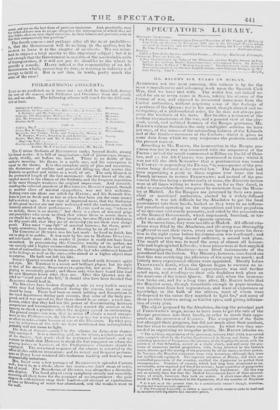PHILHARMONIC CONCERTS.
EVEN as we predicted, so it turns out : we shall be furnished, dining the rest of the season, with Sinfunias and Overtures from the yearly list, and no other. The following scheme will vouch for the fifth con- cert at least.
TART L
Sinfonia in C minor METH-TEN. Reconcil,. for your voices, Mi•s llitt'vJ:. Nils. A. in.wv, Mr J. litxxicrr, amt Mr. howl's Concerti', Ms. l'i.loof,rtt•, Midi.,' DrLrIrrN Ad.. Mr. Piti.i.trs, Possente :SUMe" Vivito ytotti \for. Au r.
Overture in D A. 110:Hut:Ha.
PART II.
Sinfonia, No. 7 tl %VIM. Neeila, ors. A. SHAW, Ali perlitlo!" BLEfIloVEN,. Qaartette, two aml Violoncello, MebsrS, VI% THOMAY, WATTs, THIAMIN/1'E, and Lt NM EY Svo:111. Blill10, Miss Baum; aud Mr. .1. BENNETT, "All! si UI " (Ougli, Imo Tell) ROSsI NI. Overture (Les Dear Journeo) C1IhRGIJINt. ',CAIN, Mr. F. CHAI4E/A—0011.111CIOL, Mr. NraTe.
The C minor Sinfonia of Borritovro ranks, beyond doubt, among his finest works: it is full of imagination—full of picturesque images, clearly, vividly, set before the mind. There is no doubt of the author's meaning; his theme is a noble one, and his conception is equal to the theme. It is this complete unity of plan and execution, this distinctness of outline and powerful filling-up, that render this Sinfonia so perfect and entire us a work of art. The only blemish is the protracted length of the last movement : the first burst of the tri- umphal march is the climax of the Siufonia, and the frequent repetition of the same thought weakens the (nights' impression. And notwith- standing the colossal grandeur of BEETtiovEN, HAYDN'S appeal, though to another class of musical sympathies, was not less welcome. Nothing even can abate our relish for HAYDN ; and his Seventh Sin- foals is just as fresh and as fair as when first horn (in the same room) half a century ago. It is no sign of improved taste, that the Sinfordas of this great master are not now welcomed with the enthusiasm which formerly attended their performance. Ilsonx used to say, " where is no melody, there is no music ;" but there is a class of musical prigs and pretenders who seem to think that where there is music there is (or should be) no melody. They imagine, because HAYDN'S Sinfonias are fifty years old, that they are of necessity (to use their own slang) panic They must " sup full" of musical horrors ; for them, grace beauty, symmetry, have no charms. A blessing be on all such ! The Concerto of hinnies teas his lust work: he lived to finish, but not to play it in public. It was sent by his son to Madame DUI.C.V. EN; and into hands more able to render it justice it could not have been committed. In pronouncing this Concerto worthy of its author, we can scarcely add a higher commendation. HUMNIEL was the last of the school of rationalists on his instrument—the last who addressed himself to the feelings as well as the ears—who aimed at a higher object than to surprise. He bath not left his like.
Scotia's Quartet wanted a leader more imbued with Sronn's spirit and style. Mr. THOMAS is a sweet and brilliant player, but his style is that of his master, Sracoot.Erri—graceful, not great. Srottit's playing is essentially grand ; and those only who have heard him lead his own Quartets know what they are. After this Quartet was de- cided to " stand part of the bill," it should also have been decided that ELAGROVE should lead it.
The Directors have broken through a rule (a very foolish one) to which they had hitherto adhered during the season, that no songs should be sung. There had been so much jobbing and favouritism in the vocal department during past seasons, that some of the body pro- posed, and it was agreed to, that there should be no songs : a tacit con- fession, either that they had not the power of discriminating between competence and incompetence, or that they wanted the courage or the honesty to cheek a practice which the majority agreed in condemning. The general impression teas, that in order td obtain is vocal engage- ment at the Philharmonic, the likeliest way wss for a singer to take— or affect to take—some lessons of one of the Directors. By what pro- cess the infraction of the ra• we have mentiousd was accomplished, probably will not come to light. The Sulu of in the scheme an Aria—was shame- fully mutilated. It is a statidieg, and, on the whole, a wholesome rule of the Society, that mash: shall be performed urtmutilated: and we venture to think that Mozahr is about the last composer on whom the Pruulfta.k11gvw or Initials ts of the PMliarmunie Directors should be employed. The occasional response of the chorus is essential to the effect of this sublime invocation ; and its recent and frequent perform- aace at Drury Lane rendered this barbarous hocking and hewing more disgracefully notorious. Mrs. SHAW sang a few passages of Betwritoves's splendid Cantata Well but it is, as a whole, above her reach—we don't mean of voice, but of mind. The Benedictus of HUMMEL was altogether a discredit- able display. The band played every symphony sweetly and smoothly, reserving all their force for the passages of accompanirnent : the poor singers in self-defence sung their loudest—all attempt at equalization
of tone or blending of voice was abanduned, and the weakest went to the wall.


























 Previous page
Previous page